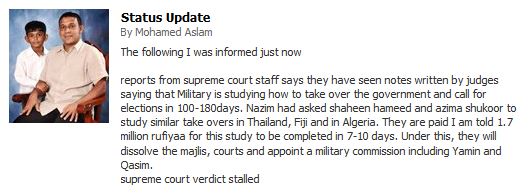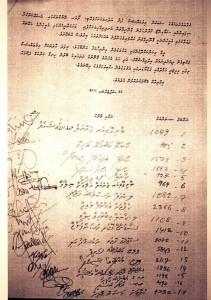The President’s Office has “condemn[ed] efforts by individuals to stop former President Mr Mohamed Nasheed from running for Office of President of Maldives.”
“[President Waheed] believes this is not the time to engage in efforts to obstruct or bar candidates from going through the electoral process. It will not help resolve the already volatile political situation in Maldives,” the President said.
The statement follows the filing of a petition at the Supreme Court against the Elections Commission (EC), challenging the candidacy of opposition Maldivian Democratic Party (MDP) candidate and former President Nasheed.
The Supreme Court petition filed today (October 10) states as grounds for stripping Nasheed’s candidacy his “outright criticism towards Islam and imposing Islamic Sharia’ in the Maldives” and his criticism of the judiciary.
Progressive Party of Maldives (PPM) Council Member Ibrahim ‘Wadde’ Waheed and President of the ‘Madhanee Iththihaadh’ (Civil Alliance) Sheikh Mohamed Didi filed the case.
The parties to the case have requested the court issue an injunction to order the Elections Commission to suspend its efforts to print ballot papers.
In an about-turn, however, the PPM has officially said the party is negotiating with ‘Wadde’ Waheed to have the case withdrawn, arguing that he had not consulted with the party leadership.
“The international community is calling for an inclusive free and fair election which all candidates are allowed to contest. We know from the language used in their statements that their remarks point to one specific individual. With the filing of the case, this issue has taken international limelight,” PPM Council Member – daughter of former President Maumoon Abdul Gayoom – and State Foreign Minister Dunya Maumoon told the press today.
The move comes shortly after the Supreme Court annulled the first round of Presidential Elections, following a petition filed by the Jumhoree Party (JP) contesting that the entire electoral process had been flawed due to discrepancies and irregularities amounting to a “systematic failure”.
The Supreme Court – in a four to three decision – annulled the poll citing electoral irregularities, despite unanimous positive assessment of the polling by more than a thousand local and international election observers.
The majority ruling cited a confidential police report submitted to the court claiming that 5623 votes were ineligible. The report has not been made public and the legal counsel of the Elections Commission was never given the opportunity to present a counter argument.
The three judges who had dissenting views raised doubts as to the credibility of the evidence submitted by the plaintiffs, while also challenging the Supreme Court’s jurisdiction over the case.
“Devious attempts”
Minivan News understands that the Supreme Court petition filed by Didi and Waheed requests that the court declare Nasheed not be allowed to contest in any election held in the country.
MDP Spokesperson Imthiyaz Fahmy – who is himself being prosecuted for criticising the courts – told Minivan News on Thursday that the petition was a “very dirty” attempt by their rivals to invalidate a candidate who had the demonstrable support of at least 45 percent of the people.
“These people are trying to finish through the court things that should be decided through the vote of the people,” said Minivan News.
“All these devious attempts tell one story. They have realised the huge defeat they have succumbed to, even before the elections. So now, their only hope it seems is to destroy the democratic values of this country, and try to contest in this election unopposed,” he added.
During a short press briefing given today after meeting the German Ambassador, Nasheed told the press that the lawsuit was not intended simply to bar him from the presidential poll, but also to ground the entire election.
“They are seeking the injunction to prevent printing of the ballot papers to delay the election as names of all candidates would be in the ballot paper,” Nasheed told the media.
The Elections Commission has previously said that no candidate would be allowed to withdraw their names even if they had decided not to contest, citing the Supreme Court’s annulment verdict which only ordered a repeat of the voting process, and not the filing of candidacy.
The former president has reiterated that, despite all efforts made to delay the elections, his MDP would go on to easily win the election.
“My opponents are advocating to bar anyone from opposing them – myself – from contesting in the presidential election. They are attempting to disallow political parties from contesting in the election, to ensure that credible elections never take place.”
“They are trying to override the highest order of the country, which is the people, and give that to the police and the military,” Nasheed said, speaking in a campaign rally on Wednesday evening in Faafu Atoll.
Nasheed’s candidacy was formally accepted by the Elections Commission in mid-July.
Nasheed and the MDP noted the politically-motivated earlier attempts to obstruct him from contesting the election, pointing to the presence of political opponents on the JSC including a rival presidential candidate.
That trial – into the detention of Criminal Court Judge Abdulla Mohamed – subsequently stalled at the high court level, after the Chief Judge Ahmed Shareef issued an injunction.
A day later the JSC suspended Shareef for what it claimed was an unrelated matter. His suspension was this week upheld by the Civil Court.
Annulment of candidacy
Should today’s PPM case be accepted by the Supreme Court, it would constitute a second attempt to bar Nasheed from contesting in a presidential election.
In October 2008 the JP’s Youth League leader Moosa Anwar filed a similar petition contending that Nasheed was not eligible to contest in the 2008 presidential election as he had been convicted for theft, which is a Hadd offence.
However, the interim Supreme Court ruled in favour of Nasheed, declaring that he was eligible to contest in the election whilst also rejecting the claim that Nasheed had been sentenced for a Hadd offence.
Earlier in March, former Human Rights Minister Dhiyana Saeed alleged that a Supreme Court judge had instructed her to file a case against Nasheed in a bid to prevent him from running for presidency in the 2013 presidential elections. Following the request, Saeed sent a letter to the Chief Justice Ahmed Faiz Hussain requesting him to investigate the matter.
Among the suggestions given by the judge, Saeed claimed at the time, were filing a case concerning Nasheed’s decision to remove eight members of parliament appointed by former President Maumoon Abdul Gayoom, prior to the ratification of the constitution.
Another suggestion given by the judge, Saeed alleged, was to refile the case filed by Anwar in 2008 against Nasheed.

